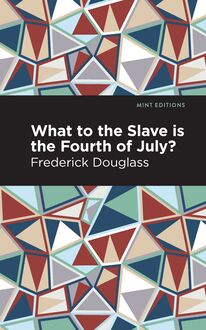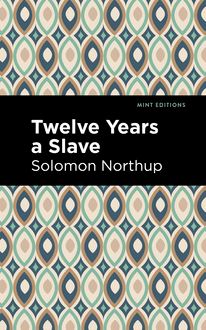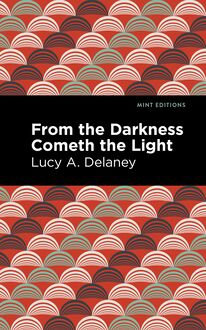-
 Univers
Univers
-
 Ebooks
Ebooks
-
 Livres audio
Livres audio
-
 Presse
Presse
-
 Podcasts
Podcasts
-
 BD
BD
-
 Documents
Documents
-
- Cours
- Révisions
- Ressources pédagogiques
- Sciences de l’éducation
- Manuels scolaires
- Langues
- Travaux de classe
- Annales de BEP
- Etudes supérieures
- Maternelle et primaire
- Fiches de lecture
- Orientation scolaire
- Méthodologie
- Corrigés de devoir
- Annales d’examens et concours
- Annales du bac
- Annales du brevet
- Rapports de stage
La lecture à portée de main
Vous pourrez modifier la taille du texte de cet ouvrage
Découvre YouScribe en t'inscrivant gratuitement
Je m'inscrisDécouvre YouScribe en t'inscrivant gratuitement
Je m'inscrisEn savoir plus
Vous pourrez modifier la taille du texte de cet ouvrage
En savoir plus

Description
Blake, or the Huts of America (1859-1862) is a novel by Martin Delany. Serialized in The Anglo-African Magazine, the novel has had a complicated publishing history due to the loss of the physical issues in which the final chapters appeared in May 1862. Despite this, Blake, or the Huts of America is considered a brilliantly unique work of fiction from an author known more for his activism and political investment in black nationalism. Through the eyes of his hero Henry Blake, Delany envisions a future of revolutionary possibility and radical resistance to slavery and oppression. Though it was largely ignored upon publication, the novel gained traction with the Black Power and Pan-Africanist Movements in the twentieth century and has earned praise from such scholars as Samuel R. Delany, who described it as “about as close to an sf-style alternate history novel as you can get.” Born free, Henry Blake is stolen into slavery from his family in the West Indies and taken to the Mississippi plantation of Colonel Stephen Franks. There, he marries Maggie, a fellow slave who happens to be the illegitimate daughter of Franks himself. When Maggie is sold away following a dispute with the master and his wife, Henry vows not only to find her, but to lead every last slave to freedom. He soon escapes, journeying in secret across the American South and interviewing enslaved African Americans along his way, learning the strategies of resistance and struggle they use every day for survival. As his reputation grows, Blake begins to organize a small uprising intended as only the first step of his radical revolutionary plan. With a beautifully designed cover and professionally typeset manuscript, this edition of Martin Delany’s Blake, or the Huts of America is a classic work of African American literature reimagined for modern readers.
Sujets
Informations
| Publié par | Mint Editions |
| Date de parution | 08 juin 2021 |
| Nombre de lectures | 0 |
| EAN13 | 9781513298351 |
| Langue | English |
| Poids de l'ouvrage | 2 Mo |
Informations légales : prix de location à la page 0,0500€. Cette information est donnée uniquement à titre indicatif conformément à la législation en vigueur.
Extrait
Blake
Or, The Huts of America
Martin R. Delany
Blake: Or, The Huts of America was first published in 1859.
This edition published by Mint Editions 2021.
ISBN 9781513296852 | E-ISBN 9781513298351
Published by Mint Editions®
minteditionbooks.com
Publishing Director: Jennifer Newens
Design & Production: Rachel Lopez Metzger
Project Manager: Micaela Clark
Typesetting: Westchester Publishing Services
C ONTENTS
1. T HE P ROJECT
2. C OLONEL F RANKS AT H OME
3. T HE F ATE OF M AGGIE
4. D EPARTURE OF M AGGIE
5. A V ACANCY
6. H ENRY ’ S R ETURN
7. M ASTER AND S LAVE
8. T HE S ALE
9. T HE R UNAWAY
10. M ERRY M AKING
11. A S HADOW
12. T HE D ISCOVERY
13. P ERPLEXITY
14. G AD AND G OSSIP
15. I NTERCHANGE OF O PINION
16. S OLICITUDE AND A MUSEMENT
17. H ENRY AT L ARGE
18. F LEETING S HADOWS
19. C OME W HAT W ILL
20. A DVENT A MONG THE I NDIANS
21. W HAT N OT
22. N EW O RLEANS
23. T HE R EBEL B LACKS
24. A F LYING C LOUD
25. L IKE F ATHER , L IKE S ON
26. R ETURN TO M ISSISSIPPI
27. A N IGHT OF A NXIETY
28. S TUDYING H EAD W ORK
29. T HE F UGITIVES
30. T HE P URSUIT
31. T HE A TTACK , R ESISTANCE , A RREST
32. T HE E SCAPE
33. H APPY G REETING
34. A N OVEL A DVENTURE
Chapter 1
T HE P ROJECT
On one of those exciting occasions during a contest for the presidency of the United States, a number of gentlemen met in the city of Baltimore. They were few in number, and appeared little concerned about the affairs of the general government. Though men of intelligence, their time and attention appeared to be entirely absorbed in an adventure of self-interest. They met for the purpose of completing arrangements for refitting the old ship “Merchantman,” which then lay in the harbor near Fell’s Point. Colonel Stephen Franks, Major James Armsted, Captain Richard Paul, and Captain George Royer composed those who represented the American side—Captain Juan Garcia and Captain Jose Castello, those of Cuban interest.
Here a conversation ensued upon what seemed a point of vital importance to the company; it related to the place best suited for the completion of their arrangements. The Americans insisted on Baltimore as affording the greatest facilities, and having done more for the encouragement and protection of the trade than any other known place, whilst the Cubans, on the other side, urged their objections on the ground that the continual increase of liberal principles in the various political parties, which were fast ushering into existence, made the objection beyond a controversy. Havana was contended for as a point best suited for adjusting their arrangements, and that too with many apparent reasons; but for some cause, the preference for Baltimore prevailed.
Subsequently to the adjustment of their affairs by the most complete arrangement for refitting the vessel, Colonel Franks took leave of the party for his home in the distant state of Mississippi.
Chapter 2
C OLONEL F RANKS AT H OME
On the return of Colonel Stephen Franks to his home at Natchez, he met there Mrs. Arabella, the wife of Judge Ballard, an eminent jurist of one of the Northern States. She had arrived but a day before him, on a visit to some relatives, of whom Mrs. Franks was one. The conversation, as is customary on the meeting of Americans residing in such distant latitudes, readily turned on the general policy of the country.
Mrs. Ballard possessed the highest intelligence, and Mrs. Maria Franks was among the most accomplished of Southern ladies.
“Tell me, Madam Ballard, how will the North go in the present issue?” enquired Franks.
“Give yourself no concern about that, Colonel,” replied Mrs. Ballard, “you will find the North true to the country.”
“What you consider true, may be false—that is, it might be true to you, and false to us,” continued he.
“You do not understand me, Colonel,” she rejoined, “we can have no interests separate from yours; you know the time-honored motto, ‘united we stand,’ and so forth, must apply to the American people under every policy in every section of the Union.”
“So it should, but amidst the general clamor in the contest for ascendancy, may you not lose sight of this important point?”
“How can we? You, I’m sure, Colonel, know very well that in our country commercial interests have taken precedence of all others, which is a sufficient guarantee of our fidelity to the South.”
“That may be, madam, but we are still apprehensive.”
“Well, sir, we certainly do not know what more to do to give you assurance of our sincerity. We have as a plight of faith yielded Boston, New York, and Philadelphia—the intelligence and wealth of the North—in carrying out the Compromise measures for the interests of the South; can we do more?”
“True, Madam Ballard, true! I yield the controversy. You have already done more than we of the South expected. I now remember that the Judge himself tried the first case under the Act, in your city, by which the measures were tested.”
“He did, sir, and if you will not consider me unwomanly by telling you, desired me, on coming here, to seek every opportunity to give the fullest assurance that the judiciary are sound on that question. Indeed, so far as an individual might be concerned, his interests in another direction—as you know—place him beyond suspicion,” concluded Mrs. Ballard.
“I am satisfied, madam, and by your permission, arrest the conversation. My acknowledgements, madam!” bowed the Colonel, with true Southern courtesy.
“Maria, my dear, you look careworn; are you indisposed?” inquired Franks of his wife, who during conversation sat silent.
“Not physically, Colonel,” replied she, “but—”
Just at this moment a servant, throwing open the door, announced dinner.
Besides a sprightly black boy of some ten years of age, there was in attendance a prepossessing, handsome maidservant, who generally kept, as much as the occasion would permit, behind the chair of her mistress. A mutual attachment appeared to exist between them, the maid apparently disinclined to leave the mistress, who seemed to keep her as near her person as possible.
Now and again the fat cook, Mammy Judy, would appear at the door of the dining room bearing a fresh supply for the table, who with a slight nod of the head, accompanied with an affectionate smile and the word “Maggie,” indicated a tie much closer than that of mere fellow servants.
Maggie had long been the favorite maidservant of her mistress, having attained the position through merit. She was also nurse and foster mother to the two last children of Mrs. Franks, and loved them, to all appearance, as her own. The children reciprocated this affection, calling her “Mammy.”
Mammy Judy, who for years had occupied this position, ceded it to her daughter; she preferring, in consequence of age, the less active life of the culinary department.
The boy Tony would frequently cast a comic look upon Mrs. Ballard, then imploringly gaze in the face of his mistress. So intent was he in this, that twice did his master admonish him by a nod of the head.
“My dear,” said the Colonel, “you are dull today; pray tell me what makes you sad?”
“I am not bodily afflicted, Colonel Franks, but my spirit is heavy,” she replied.
“How so? What is the matter?”
“That will be best answered at another time and place, Colonel.”
Giving his head an unconscious scratch accompanied with a slight twitch of the corner of the mouth, Franks seemed to comprehend the whole of it.
On one of her Northern tours to the watering places—during a summer season some two years previous, having with her Maggie the favorite—Mrs. Franks visited the family of the Judge, at which time Mrs. Ballard first saw the maid. She was a dark mulatto of a rich, yellow, autumnlike complexion, with a matchless, cushionlike head of hair, neither straight nor curly, but handsomer than either.
Mrs. Franks was herself a handsome lady of some thirty-five summers, but ten years less in appearance, a little above medium height, between the majestic and graceful, raven-black hair, and dark, expressive eyes. Yet it often had been whispered that in beauty the maid equalled if not excelled the mistress. Her age was twenty-eight.
The conduct of Mrs. Franks toward her servant was more like that of an elder sister than a mistress, and the mistress and maid sometimes wore dresses cut from the same web of cloth. Mrs. Franks would frequently adjust the dress and see that the hair of her maid was properly arranged. This to Mrs. Ballard was as unusual as it was an objectionable sight, especially as she imagined there was an air of hauteur in her demeanor. It was then she determined to subdue her spirit.
Acting from this impulse, several times in her absence, Mrs. Ballard took occasion to administer to the maid severities she had never experienced at the hands of her mistress, giving her at one time a severe slap on the cheek, calling her an “impudent jade.”
At this, Mrs. Franks, on learning, was quite surprised; but on finding that the maid gave no just cause for it, took no further notice of it, designedly evading the matter. But before leaving, Mrs. Ballard gave her no rest until she gave her the most positive assurance that she would part with the maid on her next visit to Natchez. And thus she is found pressing her suit at the residence of the Mississippi planter.
Chapter 3
T HE F ATE OF M AGGIE
After dinner Colonel Franks again pressed the inquiry concerning the disposition of his lady. At this time the maid was in the culinary department taking her dinner. The children having been served, she preferred the company of her old mother whom she loved, the children hanging around, and upon her lap. There was no servant save the boy Tony present in the parlor.
“I can’t, I won’t let her go! she’s a dear good girl!” replied Mrs. Franks. “The children are attached to her, and so am I; let Minny or any other of them go—but do not, for Heaven’s sake, tear Maggie
-
 Univers
Univers
-
 Ebooks
Ebooks
-
 Livres audio
Livres audio
-
 Presse
Presse
-
 Podcasts
Podcasts
-
 BD
BD
-
 Documents
Documents
-
Jeunesse
-
Littérature
-
Ressources professionnelles
-
Santé et bien-être
-
Savoirs
-
Education
-
Loisirs et hobbies
-
Art, musique et cinéma
-
Actualité et débat de société
-
Jeunesse
-
Littérature
-
Ressources professionnelles
-
Santé et bien-être
-
Savoirs
-
Education
-
Loisirs et hobbies
-
Art, musique et cinéma
-
Actualité et débat de société
-
Actualités
-
Lifestyle
-
Presse jeunesse
-
Presse professionnelle
-
Pratique
-
Presse sportive
-
Presse internationale
-
Culture & Médias
-
Action et Aventures
-
Science-fiction et Fantasy
-
Société
-
Jeunesse
-
Littérature
-
Ressources professionnelles
-
Santé et bien-être
-
Savoirs
-
Education
-
Loisirs et hobbies
-
Art, musique et cinéma
-
Actualité et débat de société
- Cours
- Révisions
- Ressources pédagogiques
- Sciences de l’éducation
- Manuels scolaires
- Langues
- Travaux de classe
- Annales de BEP
- Etudes supérieures
- Maternelle et primaire
- Fiches de lecture
- Orientation scolaire
- Méthodologie
- Corrigés de devoir
- Annales d’examens et concours
- Annales du bac
- Annales du brevet
- Rapports de stage




















